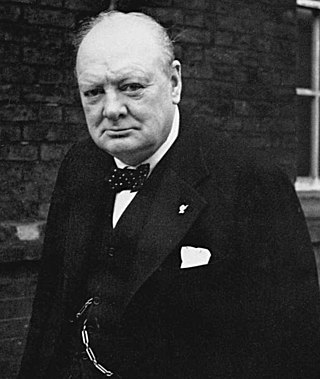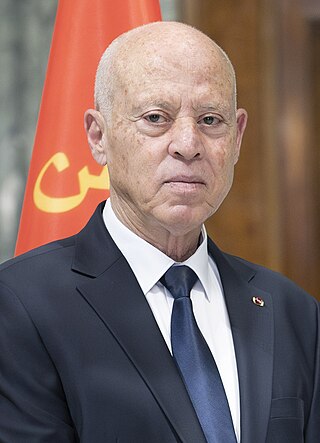
The prime minister of Tunisia is the head of the executive branch of the government of Tunisia. The prime minister directs the executive branch along with the president and, together with the prime minister's cabinet, is accountable to the Assembly of the Representatives of the People, to the prime minister's political party and, ultimately, to the electorate for the policies and actions of the executive and the legislature.

Winston Churchill formed the third Churchill ministry in the United Kingdom following the 1951 general election. He was reappointed as Prime Minister of the United Kingdom by King George VI and oversaw the accession of Queen Elizabeth II in 1952 and her coronation.

The Conservative government of the United Kingdom that began in 1957 and ended in 1964 consisted of three ministries: the first Macmillan ministry, second Macmillan ministry, and then the Douglas-Home ministry. They were respectively led by Harold Macmillan and Sir Alec Douglas-Home, who were appointed by Queen Elizabeth II.
Cheikh El Avia Ould Mohamed Khouna is a Mauritanian political figure. He was the 7th Prime Minister of Mauritania from January 2, 1996, to December 18, 1997, Minister of Foreign Affairs from July 12, 1998, to November 16, 1998, and Prime Minister again from November 16, 1998, to July 6, 2003, under President Maaouya Ould Sid'Ahmed Taya; later, he briefly served as Minister of Foreign Affairs again in 2008.

The Cabinet of Namibia is an appointed body that was established by Chapter 6 of the Constitution of Namibia. It is mandated to include the following positions: the President of Namibia, the Prime Minister of Namibia and any positions that the President so appoints.

The Cabinet of The Gambia is responsible for advising the President of The Gambia and for carrying out other functions as prescribed by law. It is composed of the President, the Vice-President, To date, all Prime Ministers and Presidents have represented and the Secretaries of State. It is responsible for regulating the procedure of its own meetings and is held accountable for its actions by the National Assembly, according to Sections 74 and 75 of the Constitution of The Gambia.

Japan–Somalia relations are bilateral relations between Japan and Somalia. Japan has a non resident ambassador in Nairobi.

Globally, women are largely under-represented in STEM-related fields; this under-representation is especially prevalent in Africa where women represent less than 20% of the workforce in these fields. African women in engineering and STEM related fields are more susceptible to discrimination and to be devalued in African countries.Regardless of this lack of representation in STEM-related work, there are many important female engineers from across the continent. Furthermore, a number of organizations within and out of Africa are working towards minimizing the disparity within the workforce.

Kais Saied is a Tunisian politician, jurist and retired professor of law currently serving as the seventh president of Tunisia since October 2019. He was president of the Tunisian Association of Constitutional Law from 1995 to 2019.

The Shmyhal government is the current government of Ukraine, formed on 4 March 2020 and led by Denys Shmyhal, who was previously serving as Deputy Prime Minister in the Honcharuk government, and the Governor of Ivano-Frankivsk Oblast.
Events in the year 2021 in Tunisia.

Najla Mohammed El Mangoush is a Libyan diplomat and lawyer. She was Libya's foreign minister in Abdul Hamid Dbeibeh's government from 15 March 2021 until her dismissal on 28 August 2023. El Mangoush is Libya's first female foreign minister, and the fifth woman to hold the position of a foreign minister in the Arab World.

The 2021 Tunisian self-coup took place on 25 July 2021, when Tunisian President Kais Saied dismissed the government of Hichem Mechichi, suspended the Assembly of the Representatives of the People and revoked the immunity of its members. Described as a self-coup, the move came after a period of political instability marked by a series of protests against the Ennahda-backed government and the collapse of the Tunisian healthcare system amidst the COVID-19 pandemic in the country.

Najla Bouden, also known as Najla Bouden Romdhane, is a Tunisian geologist and university professor who served as the prime minister of Tunisia from October 2021 to August 2023. She took office on 11 October 2021, making her the first female prime minister both in Tunisia and the Arab world. She previously served in the education ministry in 2011.
Fadhila Rebhi is a Tunisian politician who served as Minister of Trade and Export Development in the Bouden Cabinet.
Events in the year 2023 in Tunisia.
Ahmed Hachani is a Tunisian politician. Since 1 August 2023, he is serving as the Prime Minister of Tunisia.

The Hachani Cabinet is the current government of Tunisia since 2 August 2023. It is led by Prime Minister of Tunisia Ahmed Hachani.













